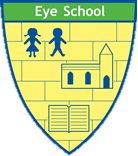Reading
At Eye CE Primary School, we believe that all children should be actively encouraged to develop a love of reading to lead them onto a path of ‘lifetime reading’.
We encourage everyone to find a love of books and to embark on their reading journey.
In order to be successful in other areas of their learning, children need to be successful readers. Due to this, we encourage children to be reading at home at least 5 times each week. For pupils in EYFS and KS1, this should be recorded in their reading records that allow our teachers to track the number of reads that have been completed. For pupils in KS2, they have an online reading record called 'Boom Reader' where they are encouraged to read 5 times a week and log it to help their class get to the top of the school's Boom Reader leader board!
As well as reading at home, children have a range of opportunities for reading in school. We are privileged to have a range of adult volunteers who give up their time to read with children on a 1:1 basis. Children also take part in daily 'Whole Class Reading' sessions (Year 3-6). We hold a range of reading events throughout the year including author and poet visits, bedtime story evenings for our Foundation Stage children and exciting ways to celebrate World Book Day.
Our school has a reading superhero named 'Bookman' who encourages the children to read regularly. He has many reading superpowers because he is always reading!
Whole Class Reading
EYFS
EYFS will be learning to read in their phonics sessions using the Sounds-Write approach.
Year 1
Year 1 will be practising reading fluently in their phonics sessions. They will be using texts from Sounds Write to support their units of learning.
Years 2 - 6
Children in Years 2 - 6 have 4 reading lessons each week, in addition to English lessons. In Year 2, the children have phonics, reading and English lessons each week. We have developed individual types of reading sessions that touch on different aspects of reading.
There are 3 different types of reading sessions that the children will participate in:
- Extended Reading
- Fluency Reading
- Close Reading
Extended reading and fluency reading sessions are completed in Years 2 and 3. In Years 4-6, the children participate in all 3 different types of reading sessions.
An overview of the different types of reading sessions
Extended Read Session
- Most of the session is spent reading a longer text
- Children take turns reading (or read silently in short, predetermined bursts once majority of class is fluent)
- Questions and discussion throughout, mainly to establish meaning
- 2/3 of the session spent reading and enjoying a text, 1/3 of the session is spent on discussion e.g. teacher explaining something, high quality questions on an aspect worth considering
Fluency Read Session
- Short extract read aloud to the children by the teacher before being read multiple times by the children
- Accuracy, automaticity, prosody is a key focus
- Children read the same extract aloud to a partner, switch roles and then repeat 3-4 times
- With each read of the text, the children hopefully become a little more fluent
- The text is discussed with the children afterwards - using comprehension skills
Close Read Session
- Short/moderate length text read by children, step-by-step
- The chosen text is read twice:
1) Reading like a reader - comprehension questions asked throughout
2) Reading like a writer - unpicking grammatical features, vocab choices, impact on the reader etc. - Purpose of the session = reading in a deeper sense e.g. vocab choices, metaphors in a text, sentence length/structure, punctuation choices.
- Unpicking a text to understand its meaning
- Meaning established and analysed
- Explores what the author is doing and why the author has done that
- 1/3 of the session spent reading, 2/3 of the session spent on discussion - a reverse on the extended reading session
Vocabulary is at the heart of our curriculum and so vocabulary is planned for and pre-taught at the start of each session.
Texts for 'Whole Class Reading' sessions have been chosen carefully and are outlined on our English long term overview documents for each year group.
At Eye, Whole Class Reading is supported with daily phonics/spelling teaching in all year groups, reading for pleasure and reading across the curriculum activities. Teachers model reading to children regularly.
